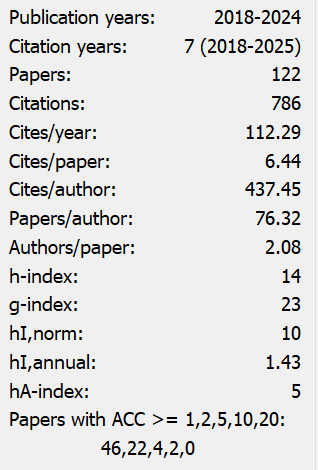Experiencing an Opposite Gender Boss
A Phenomenological Study of a Private Organization
Abstract
The increasing trend of the employed female workforce, subsequently, augment their work associated with the employed male workforce. Hence, it provides a significant basis to undertake a research study for exploring employee working experience with opposite gender boss. The present qualitative research is based on ontological philosophical assumption having social constructivism as an interpretive framework and uses a phenomenological approach to extract the essence of employees lived working experience with an opposite gender boss. A semi-structured interview of not more than an hour was conducted with each of the 5 {Females (3) and Male (2)} employees of private higher education institute. The research reveals instead of boss's gender the employee working experience is based on Boss's Personality, Leadership Style and Professionalism. Further, the "Work Efficiency" and "Professionalism" of both male and female subordinates' increases while working with opposite gender boss. However, in terms of "Career Development" male bosses concentrate on developing subordinate's knowledge while female on the position. Also, Boss's personal conduct i.e. his/her age, dressing, and schedule don't contribute to subordinate's development. The research findings amplify knowledge base of employee working experience with opposite gender boss that can also be used to conduct further studies and solidify the subordinate-supervisor relationship.
References
Awan, M. S., Malik, N., Haroon, S. & Waqas, M. (2011). Impact of Education of Poverty Reduction. International Journal of Academic Research, 3(1), 659-664.
Balgiu, B. A. (2013). Perception of Women as Managers: The Difference of Attitudes between Employees and Non-Employees. Procedia - Social and Behavioral Sciences, 78, 330-334.
Bender, K. A., Donohuey, S. M., & Heywoodz, J. S. (2005). Job satisfaction and gender segregation. Oxford Economic Papers, 57, 479-496.
Chen, Y., Friedman, R., & Simons, T. (2014). The Gendered Trickle-Down Effect How Mid-Level Managers’ Satisfaction with Senior Managers’ Supervision Affects Line Employee’s Turnover Intentions. Career Development International, 19(7), 836-856.
Eagly, A. H., Johannesen-Schmidt, M. C., & van Engen, M. L. (2003). Transformational, Transactional, and Laissez-Faire Leadership Styles: A Meta-Analysis Comparing Women and Men. Psychological Bulletin, 129(4), 569-591.
Giorgi, A. (2008). Concerning a serious misunderstanding of the essence of the phenomenological method in psychology. Journal of Phenomenological Psychology, 39, 33-58.
Greenhaus, J. H., & Parasuraman, S. (1993). Job Performance Attribution and Career Advancement Prospectus: An Examination of Gender and Race Effects. Organizational Behaviour and Human Processes, 55, 273-297.
Gupta, N., Beehr, T. A., & Jenkins, G. D. Jr. (1980). The Relationship Between Employee Gender and Supervisor-Subordinate Opposite-Ratings. Academy of Management Journal, 1, 396-400.
Hasan, S. A., Zahid, I., & Subhani, M. I. (2011). The Effect of Supervisor-Subordinate Gender on Subordinates Involvement an Opposite Managerial Functions. Interdisciplinary Journal of Contemporary Research on Business, 3(2), 314-324.
Herrera, R., Duncan, P. A., Green, M. T., & Skaggs, S. L. (2012). The effect of gender on leadership and culture. Global Business and Organizational Excellence, 31(2), 37-48.
Kasuso, T. G. (2015). The Definition of an “Employee” Under Labor Legislation: An Elusive Concept”. The University of South Africa, Retrieved March 31, 2019, from http://uir.unisa.ac.za/bitstream/handle/10500/21121/dissertation_kasuso_tg.pdf?sequence=1&isAllowed=y
Katić, S., & Skledar, A. (2014). Team effectiveness - the impact of gender differences on satisfaction in teamwork”. Proceedings of the 6th International Conference on Applied Economics, Business and Development (AEBD’14), 100-104. Lisbon, Portugal. ISBN: 978-960-474-394-0
Kevin, J. K., & Sone, P. M. (2015). Gender in Military: A Phenomenological Study of the Lived Experiences of Female Soldiers in the Cameroon Army. International Journal of Social Sciences Research, 3(1), 100-119.
Lester, B. L. (2015). Effects of Cross-Gender on Women Executives. Trinity Washington University, Retrieved April 27, 2016, from http://www.trinitydc.edu/bgs/files/2015/01/Lester-Brittany-Final-Clean-1262015.pdf
Nayab, D. E., Asrar, M., Younes, M., & Chisfti, A. F. (2015). Analyzing Factors Influencing Private Sector School Children Parents’ Choice in Selecting School for Their Children. Proceedings of the 13th International Conference on Statistical Sciences Peshawar, 205-220. Peshawar, Pakistan.
Okhuysen, G. A., Lepak, D., Ashcraft, K. L., Labianca, G., Smith, V., & Steensma, H. K. (2013). Theories of Work and Working Today. Academy of Management Review, 38(4), 491-502.
Paustian-Underdahl, S. C., Walker, L. S., & Woehr, J. D. (2014). Gender and Perceptions of Leadership Effectiveness: A Meta-Analysis of Contextual Moderators. Journal of Applied Psychology, 99(4), 1-17.
Perko, A. (2012). Attitude of Male Employees Toward Female Managers in Selected Organizations in Ghana. Journal of Arts, Science & Commerce, 3(3), 86-93.
Rosen, B., & Jerdee, T. A. (1997). Influence of Sex Role Stereotypes on Personnel Decisions. Journal of Applied Psychology, 59(1), 9-14.
Sleekier, N. A., & Rosenthal, R. (1985). Sex Differences in Nonverbal and Verbal Communication with Bosses, Peers, and Subordinates. Journal of Applied Psychology, 70(1), 157-163.
World Bank – Data on Pakistan accessed on 10th April 2016: http://data.worldbank.org/country/pakistan
World Bank. (n.d.). Retrieved March 21, 2016, from http://data.worldbank.org/country/pakistan

This work is licensed under a Creative Commons Attribution 4.0 International License.
Copyright for this article is retained by the author(s), with first publication rights granted to the journal.
This is an open-access article distributed under the terms and conditions of the Creative Commons Attribution license (http://creativecommons.org/licenses/by/4.0/).


























